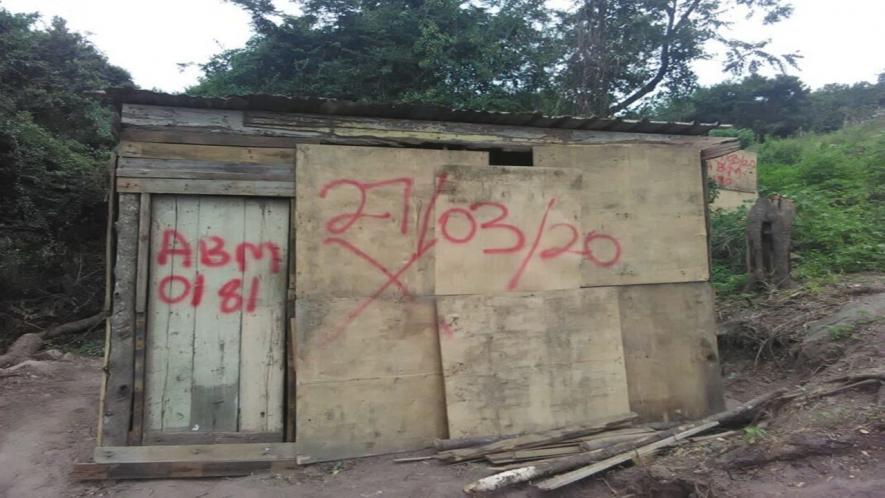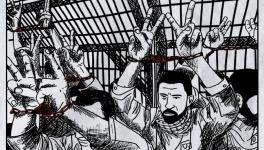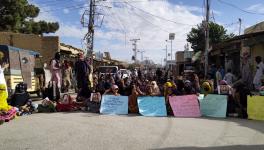As South Africa Locks Down, the Homeless Left Most Vulnerable

One of the 17 shacks marked for demolition in Durban, South Africa.
A 21-days lockdown ordered by president Cyril Ramaphosa has been enforced in South Africa to contain the spread of COVID-19, since midnight, March 27. However, the security forces are being accused of taking harsh measures against shack dwellers and homeless people in the country, who are most vulnerable to the outbreak.
Soon after the lockdown period began, security forces patrolling in downtown Johannesburg, the country’s commercial capital, took to emptying the streets, yelling at people to “Go home!” and chasing the homeless with batons forcing them to flee, Associated Press (AP) reported. Sustained gunfire at around 3 a.m was also reported by the AP.
The military has been ordered to assist the police in enforcing the lockdown. President Ramaphosa, unusually clad in army fatigues, called in the police and army personnel to be a “force of kindness” in his national address to enforce the lockdown.
“Our people,” he said in his address, “are terrified right now, and we should not do anything to make their situation worse.”
On March 23, in a previous address to announce the lockdown, Ramaphosa had claimed that the government was in the process of identifying “Temporary shelters that meet the necessary hygiene standards” to accommodate “homeless people. Sites are also being identified for quarantine and self- isolation for people who cannot self-isolate at home.” By then the number of confirmed cases in the country had reached 402.
However, this process has not yet been completed, despite the lockdown already in place. There are approximately 200,000 homeless people in South Africa, a country with the most unequal wealth distribution in the world.
There are about 150 million homeless people worldwide (2% of the population), who cannot afford a home and live on the streets. Another 1.6 billion people (over 20% of the world’s population) live in “inadequate housing” – crammed together in small makeshift shacks in informal settlements or slums, lacking access to running water, toilets and other basic amenities.
Millions living in such conditions in South African cities find it impossible to self-isolate, practice physical distancing, or to wash hands frequently and follow other safety precautions necessary to contain the spread of the pandemic.
Furthermore, the shack dwellers and their informal settlements face frequent demolitions and violent eviction at the hands of the authorities, often rendering them homeless.
Shack dwellers movement Abahlali baseMjondolo has called for a moratorium against such forced evictions until the spread of COVID-19 is contained. Abahlali has been fighting for the right to adequate housing and assisting the shack dwellers build their settlements since 2005.
Along with Abahlali, 26 other social justice organizations have joined the call for a moratorium on evictions in a letter forwarded to concerned government bodies. “One cannot practice physical distancing should you find yourself and your belongings on the side of the road or in an open space and exposed to the public,” the letter states.
Under enormous pressure, justice minister Ronald Lamola, in his national address just ahead of the lockdown, promised that no evictions will be carried out in these 21 days.
However, eight shacks were demolished in eThekwini municipality the very next afternoon, after the first two deaths in South Africa due to COVID-19 were confirmed. The total number of confirmed cases in the country had crossed 1,000 by then. The demolition was carried out using a private security agency called Calvin Security.
Another 17 shacks have been left with markings, “indicating that Calvin Security are planning to come back to evict again. The building materials for the eight shacks that were destroyed were pulverised and left in small pieces. A number of people have been left with injuries,” Abahlali said in a statement.
“No Court Order was produced and therefore the evictions were illegal and criminal. They were also in violation of the rules governing the national state of disaster,” Abahlali’s statement claimed.
UN Special Rapporteur on the Right to Housing Leilani Farha, in a statement on March 21, also called for a global ban on evictions during periods of lockdown, a strategy embarked upon by many countries facing the threat of a severe outbreak.
“A global policy has emerged to contain the virus: Stay home and Wash your hands,” she said. “The logical extension of a global “stay-home policy” is a global ban on evictions. There must be no eviction, of anyone, anywhere, for any reason. Everyone must be able to stay home.”
Get the latest reports & analysis with people's perspective on Protests, movements & deep analytical videos, discussions of the current affairs in your Telegram app. Subscribe to NewsClick's Telegram channel & get Real-Time updates on stories, as they get published on our website.
























